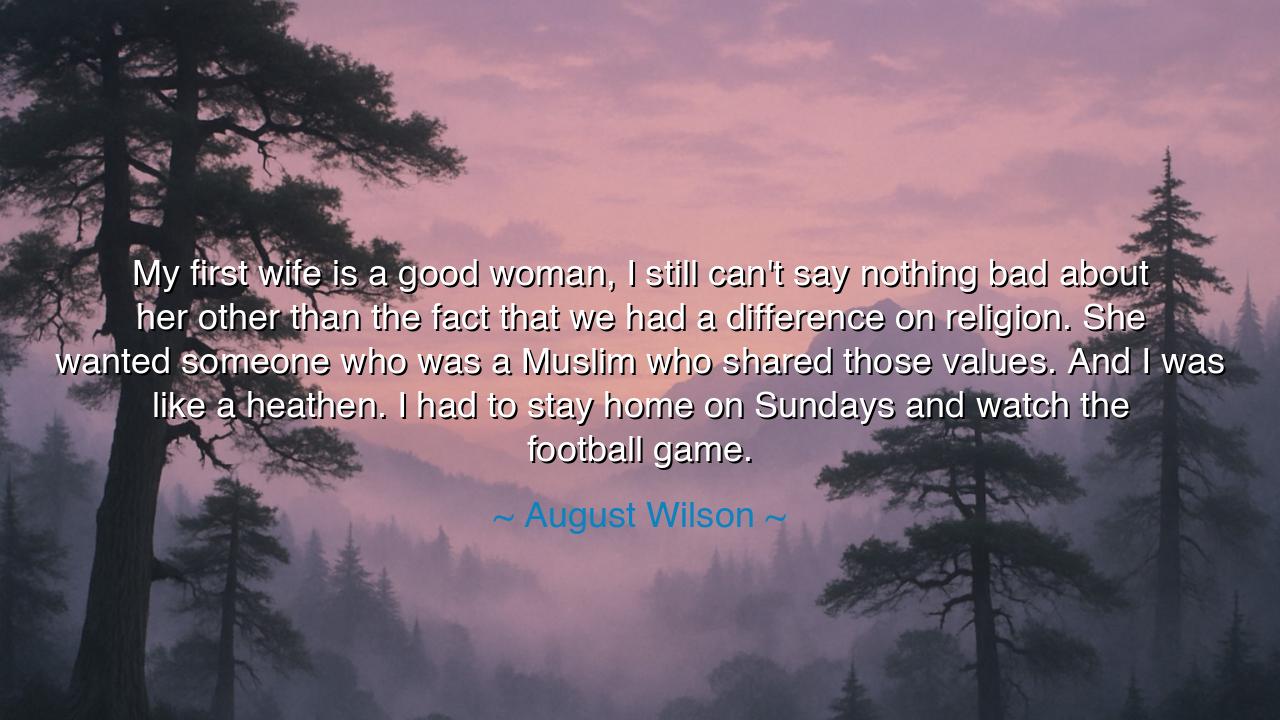
My first wife is a good woman, I still can't say nothing bad
My first wife is a good woman, I still can't say nothing bad about her other than the fact that we had a difference on religion. She wanted someone who was a Muslim who shared those values. And I was like a heathen. I had to stay home on Sundays and watch the football game.






August Wilson, master of words and soul of the stage, once spoke with both sorrow and tenderness: “My first wife is a good woman, I still can't say nothing bad about her other than the fact that we had a difference on religion. She wanted someone who was a Muslim who shared those values. And I was like a heathen. I had to stay home on Sundays and watch the football game.” In this confession lies not merely the story of a marriage, but the universal truth of human relationships—that even love may falter when the roots of faith and values grow apart. His words are humble, admitting fault without bitterness, acknowledging goodness even in parting.
In ancient times, the elders often said that marriage is like two rivers joining to form a greater stream. But if those rivers flow in opposite directions, no union can last. Here, Wilson reveals such a struggle: the difference on religion, that unyielding divergence of belief. His wife sought the sacred rhythm of prayer and discipline, while he, by his own admission, was drawn not to devotion but to the football game, the pastime of leisure and escape. Neither choice makes one wicked, yet the distance between them became a canyon too wide to cross.
History bears many such tales. Recall the story of Emperor Akbar of India, who sought to bridge faiths by marrying women of different religions and creating dialogue between Hindus, Muslims, and Christians. Though he reigned with wisdom and tolerance, even he could not erase the tensions that faith can sow within a household. Some of his unions flourished with respect, while others trembled under the weight of divided belief. His life teaches us that love can aspire to transcend difference, but it cannot always conquer it if the heart yearns for unity of the sacred.
Wilson’s words are not sharp with regret but softened with grace. He calls his wife a good woman, refusing to tarnish her memory. This too is wisdom: that even when a bond dissolves, one may honor what was true and kind within it. Many fall into the trap of anger, seeking to justify their pain with accusations. But the noble heart remembers the good even in parting, and speaks with reverence rather than contempt. Here, Wilson shows us the strength of humility, the power of gratitude even in loss.
And yet, beneath his humor—“I had to stay home on Sundays and watch the football game”—we hear the ache of a man who knew he could not give what was asked of him. It is the cry of one who recognizes his own shortcomings, his own heathen indifference, not with pride but with honesty. This honesty itself is a form of wisdom, for to admit one’s limits is the first step toward understanding oneself. The ancients would say: He who knows his weakness is already strong, for he will not deceive himself.
The lesson is clear: love requires shared foundations. It is not enough to admire one another’s beauty or kindness; one must also walk in harmony of spirit, lest the road divide. This does not mean that difference cannot coexist—indeed, many marriages thrive across cultures and creeds—but it requires both hearts to embrace the other’s path with sincerity. Without that, love may be tender yet unsustainable, as Wilson’s story reveals.
Practical actions flow from this truth. Before binding your life to another, ask deeply: Do we share the same vision of what is sacred? Do we honor the same truths, or at least honor each other’s with equal devotion? Speak of your values openly, not only of your desires. If differences appear, decide together whether they can be embraced or whether they will one day divide you. And should a bond end, follow Wilson’s wisdom: speak not with bitterness, but with gratitude, honoring the goodness that was.
O listener, remember this: relationships are not only the weaving of hearts but also the weaving of beliefs. To love is noble, but to love with shared purpose is divine. Differences on religion or values need not breed hatred, but they must be understood. And if paths diverge, let them diverge with dignity, as August Wilson has shown us—with humility, with honor, and with a memory that blesses rather than curses. For in this way, even loss becomes a teacher, and even parting leaves behind the fragrance of wisdom.






AAdministratorAdministrator
Welcome, honored guests. Please leave a comment, we will respond soon